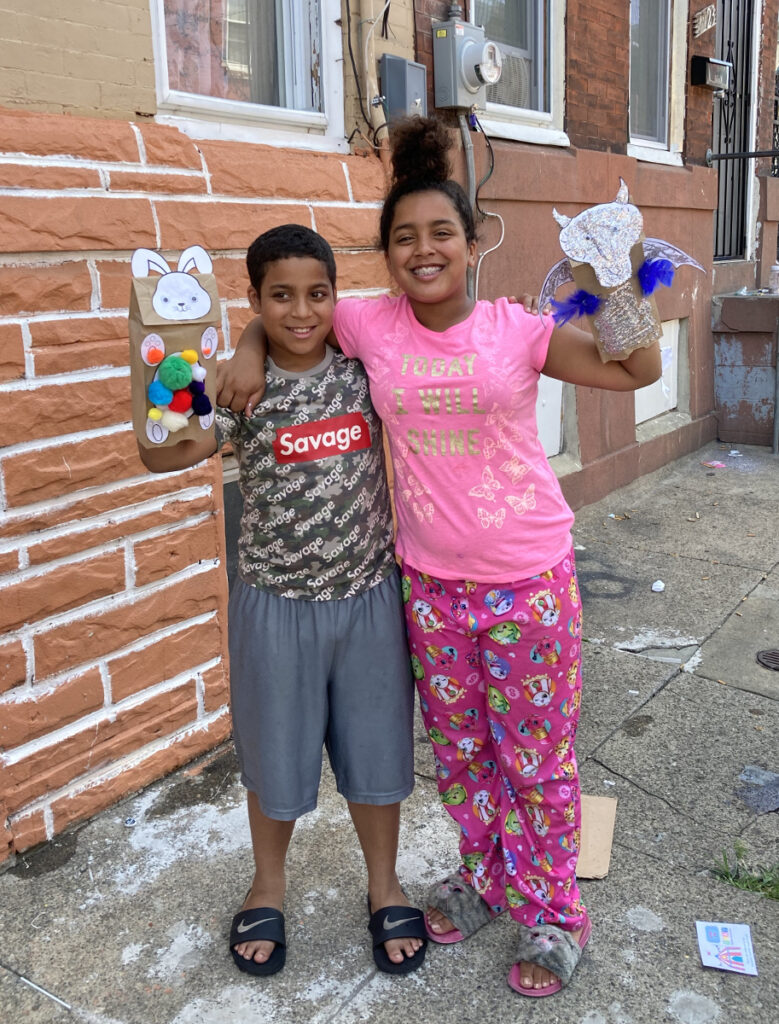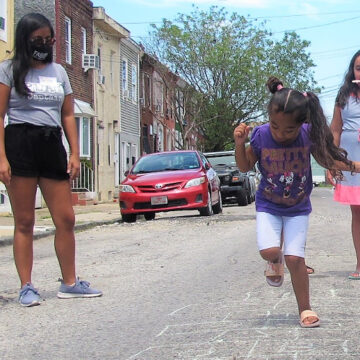The COVID-19 pandemic upended life for kids all across the country. Its drastic impact on young people is already well-documented, including decreased physical activity, learning obstacles or difficulties with virtual learning, and, perhaps most strikingly, a marked increase in the proportion of children’s mental health emergencies (such as suicide, eating disorders, anxiety, and depression) in the United States. While the challenges and uncertainty of the pandemic impacted every child, Adverse Childhood Experiences (ACEs) such as job loss or illness or death of a family member, were felt even more acutely by children of color. Such experiences can lead to toxic stress responses in children, which have profound effects on their long-term health and development.
Research shows that play can provide an important buffer to stress for children, which is why expanding playful learning opportunities within the built environment and through children’s daily routines is now doubly important to support mental health for children who are increasingly exposed to ACEs. Dr. Michael Yogman, a pediatrician in practice at Cambridge Hospital and Harvard Medical School and a member of the Board of Trustees for Playful Learning Landscapes Action Network (PLLAN), says that integrating play into children’s everyday lives is fundamental to the development of the social-emotional, cognitive, and self-regulation skills that allow kids to manage increased stress from the pandemic.
We will never solve the mental health crisis by adding more in-patient mental health beds.
Michael Yogman, MD
“We will never solve the mental health crisis by adding more in-patient mental health beds,” said Dr. Yogman. “Instead, we need to focus on prevention strategies such as playful learning. Along with physical exercise, playful learning opportunities facilitate social interactions, communication and connection with caregivers, the joy of creativity, and collaborative problem-solving – all of which can provide children with the skills needed to prevent adverse mental health outcomes,” said Dr. Yogman.

Ensuring equitable access to play is an important strategy to support the resolution of this mental health crisis. Many schools and community centers remain uncertain about the safety of reopening amidst the ongoing pandemic. Integrating child-focused design interventions into the fabric of every neighborhood is more important now than ever as students navigate the transition back to in-person learning. Sparking playful learning moments will help balance the need for students’ academic catch-up with support for social-emotional skills lost through the pandemic, according to Dr. Yogman.
A national partnership between KABOOM! and Playful Learning Landscapes Action Network (PLLAN) aims to do just that. Together both organizations are working to scale up the playful learning approach in communities across the United States. This partnership was born out of Play Everywhere Philly, a program created by KABOOM! with support from the William Penn Foundation and PLLAN in an effort to boost child development and literacy skills through interactive play installations in everyday locations across Philadelphia. In 2020, the program announced sixteen winners across Philadelphia who will create playful learning spaces in everyday locations like lobbies, public transit stops, or laundromats. These new opportunities to play, learn, and build bonds with caregivers are assets to children who are coping with the unique stressors of the pandemic, especially those who live in historically disinvested neighborhoods with diminished access to safe playspaces.
Child-Caregiver Bonds Create a Long-Term Impact
Play offers more than short-term relief following stressful experiences, says Dr. Yogman. It can also set children up for improved and abiding resilience by encouraging “flourishing,” a term describing interest and curiosity in learning new things, persistence in completing tasks, and capacity to regulate emotions. Flourishing is a crucial indicator of children’s continued ability to bounce back following ACEs.
“Flourishing children are more likely to manage adversity in the home from job loss or illness with constructive and supportive solutions,” explained Dr. Yogman.
Flourishing is predicted by family resilience and connection, spurred by activities such as playing together. Play Everywhere installations such as the interactive mural at Puentes de Salud or the town center at the Nationalities Services Center can transform time spent waiting or accomplishing errands into moments for children to play and learn with their caretakers. Especially for families who do not have a high-quality playspace nearby where they live, learn, and work, these bond-building moments are critical to support flourishing.
“With children suffering from both a mental health crisis and an educational challenge, we need to make sure that they have somebody to turn to, somebody they can trust within a consistent, positive, and nurturing relationship,” said Dr. Yogman. “Play is a wonderful way to facilitate that.”
Michael Yogman, MD
Dr. Yogman is a pediatrician in practice at Cambridge Hospital and Harvard Medical School in Cambridge, Mass. He is Assistant Professor of Pediatrics at Harvard Medical School where he teaches and does research on the father–child relationship, developmental interventions, nutrition and behavior, playful learning and behavioral health integration in primary care.

He has been a Fellow of the American Academy of Pediatrics since 1973 and was one of the first pediatricians to be board certified in Developmental Behavioral pediatrics in 2002. He is the editor of several books (In Support of Families, published by Harvard University Press; Affective Development in Infancy; and a biennial series Theory and Research in Behavioral Pediatrics) and author of numerous articles and chapters on the father-infant relationship, infant diet and sleep, and parent infant play. He recently authored the American Academy of Pediatrics policy statement on buffering stress and promoting resilience. Dr. Yogman received his undergraduate degree from Williams College and his medical degree from Yale University. He holds a M.Sc. degree in Maternal and Child Health from Harvard School of Public Health. He is married to Dr. Elizabeth Ascher and has two grown daughters and four dogs.
